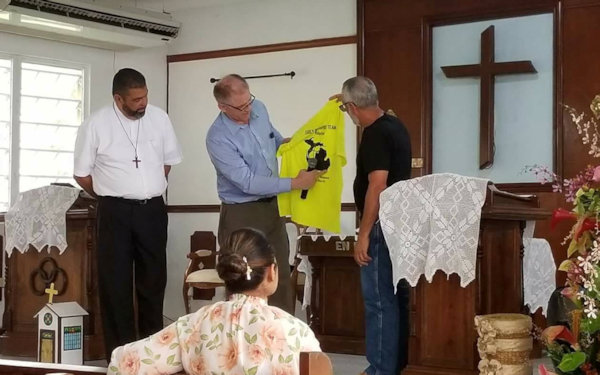An Early Response Team from Grand Rapids First UMC is at work in Puerto Rico.
KAY DEMOSS
Senior Editor-Writer, Michigan Conference
It became the 13th named storm of 2017 when it hit Puerto Rico on September 20, but Maria was not just one more hurricane in the Atlantic Ocean. Maria killed hundreds and left thousands more suffering from flooding, lack of resources and widespread power outage.
Now, five months later, Early Response Teams are going to the island to repair damaged buildings and to restore broken lives. On Thursday, March 1, 2018 a 10-member team left Grand Rapids, Michigan flying to San Juan to engage in six days of home repair in Patillas on the southeastern coast. They return to Michigan on March 11.
The team, all members of Grand Rapids: First UMC, were prepared along United Methodist Committee on Relief guidelines by Bob McCormick, ERT Trainer for the Michigan Conference. Members are now certified not only for the Puerto Rico trip but are “on call” for recruitment by ERTs in the North Central Jurisdiction of The United Methodist Church.
Early Response Teams are equipped with more than drills and dry wall. They are made ready to walk along-side those suffering disaster in a partnership that provides hope even as it provides shelter. ERT team members have special roles from equipment manager to listener/recorder. A Skill Survey is provided for the team; the Grand Rapids group includes a full-time roofer and a Stephen Minister. No one on the team speaks Spanish but they will be provided a translator on site.
The team began to organize last November. Why does it take five months for ERT teams to be sent to a disaster site? Grand Rapids team leader, Myron Donajkowski explains: “Before teams are sent in, there are things to be taken care of. There are a lot of issues to be grappled with.” If volunteers go in too soon they “become refugees” as well as an impediment to first responders.
Once the situation on the ground opens to volunteer assistance, authorities begin to invite teams in. The Grand Rapids: First team received their invitation from the ReHace Program, the holiness arm of The Methodist Church of Puerto Rico (MCPR). In Spanish the verb “hacer” means “to do.” What this and other teams will do is officially engage in the “Reborn, Revive, and Rebuild” project at the core of ReHace.
On a practical level that means working on two homes installing a corrugated roof and wall sidings, wiring, and putting in doors and windows. Of course there will be some free time for relationship, worship and meals together. They will be working in a camp without electrical power on homes most likely to not be FEMA grant recipients. According to UMCOR recon teams and MCPR, mountain areas will likely not receive electricity until mid to late summer 2018.
The first ERT went to Puerto Rico in late February; they were from North Carolina. The Grand Rapids ERT is one of the first going to the south end of Puerto Rico where Maria stuck the hardest. “No team member hesitated to step forward to do this,” Myron says. “We don’t have a lot of young muscles but we have experience and can do the job.”
Both the congregation and the community in Grand Rapids are firmly behind the effort. Contributions toward tools, materials and equipment exceeded the goal. Myron reports that the Ladies Auxiliary of the Polish Falcon Hall offered enthusiastic support. When he explained the project to them, they said, “Let’s buy a generator for you guys!”
That’s empowerment that will last as MCPR asked that tools brought in by the team be left for use by future volunteers. Those interested in details of what it takes to get to work on an ERT can review the Grand Rapids Team fund-raising page.
None of the ten members of the Grand Rapids ERT have ever volunteered outside the continental United States. The Welcome Letter from ReHace ended, “Thank you very much for your great love towards our country.” Surely God’s love is behind the willingness to volunteer for such an adventure promising a bunk bed, no electricity and cold showers. But “modern convenience” is not necessary for warm hospitality.
When asked why he raised his hand when a group leader was needed, Myron said, “I was a project manager for 30 years. I felt called, so I raised my hand. My main goal is to do some good work for God and bring everyone home safe.” Lots of emails. Lots of background checks. Lots of details. Myron adds, “I would not discourage anyone from tackling leadership of an ERT. Just know it’s not to be taken lightly.” He expects that a second ERT will deploy from Grand Rapids: First UMC later this year.
The team is posting reports on Facebook as they are able. To follow their work go to First United Methodist Church.
Click here for more information about Michigan Conference Disaster Response.
Last Updated on December 28, 2022

